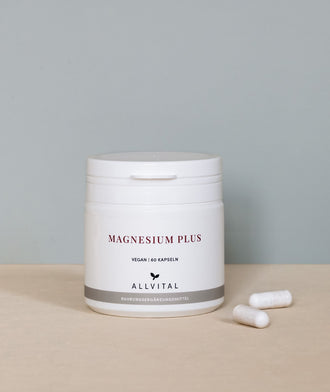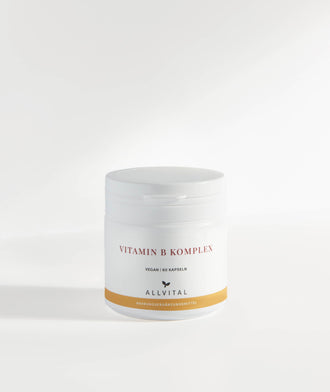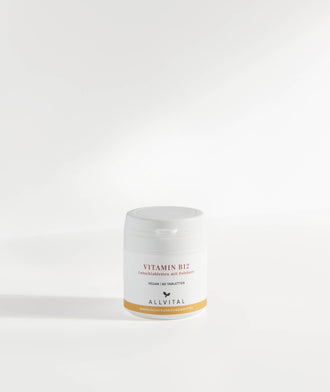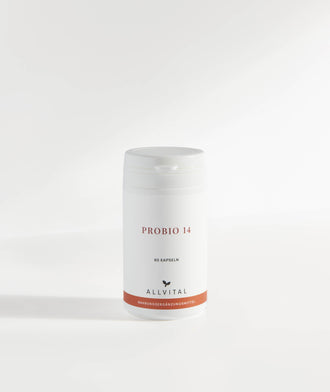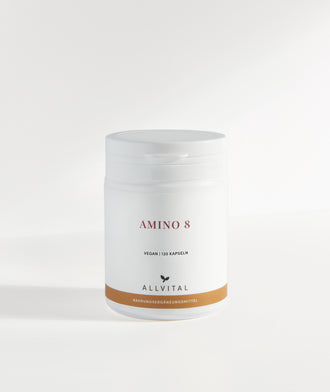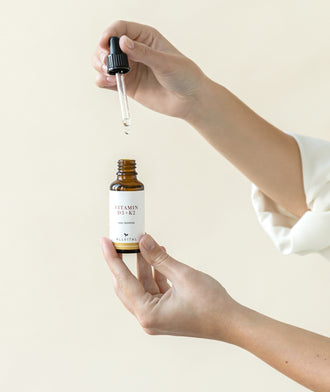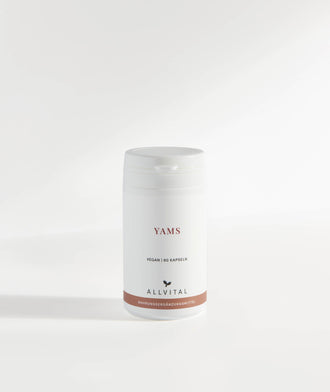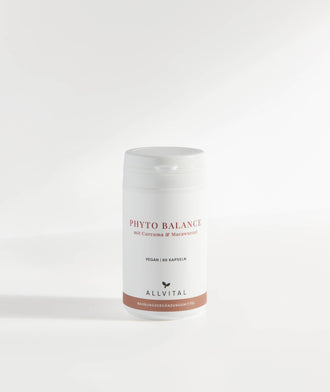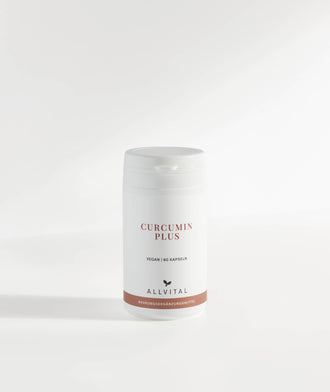
Natural hormone balance for women
Hormones regulate far more than just the female cycle – they also influence energy levels, sleep, mood, skin health, and many other bodily processes.
When hormone levels become unbalanced, it can manifest in a variety of ways. In this article, you’ll learn how to naturally support your hormonal health and restore balance.
When hormones fall out of balance
Hormones are biochemical messengers that regulate countless processes in the body – from metabolism and sleep to fertility, mood, and immune function.
A hormonal imbalance can show up in many ways: physically, emotionally, or cognitively. The symptoms can vary from person to person and depend on factors like life stage and underlying causes.
Symptoms of hormonal imbalance
Hormonal fluctuations or deficiencies don’t just affect women transitioning into menopause – they can occur at any stage of life. Here’s an overview of possible signs that your hormones may be out of balance.
Physical symptoms:
- Irregular cycles (e.g. missed, shortened, or prolonged periods)
- Weight gain or difficulty losing weight
- Acne and other skin changes
- Persistent fatigue and low energy
- Hot flashes and excessive sweating
- Hair loss
- Decreased libido
- Muscle and joint discomfort
- Blood sugar imbalances
Emotional symptoms:
- Mood swings
- Irritability or low mood
- Anxiety or inner restlessness
- Feeling overwhelmed or emotionally unstable
Cognitive symptoms:
- Trouble concentrating
- Forgetfulness or memory issues
- “Brain fog” – difficulty thinking clearly
Emotional symptoms like these often indicate an imbalance in stress hormones – particularly cortisol. It’s important to look for root causes with a holistic approach, rather than quickly assuming a mental health diagnosis.
Possible causes of hormonal imbalance in women
In today’s modern world, we’re exposed to many factors that can disrupt hormonal balance. Below are some of the most common contributors.
Chronic stress and elevated cortisol levels
Ongoing psychological or physical stress leads to increased production of the stress hormone cortisol. Elevated cortisol can suppress the production of other important hormones such as progesterone and estrogen. It also disrupts the sleep-wake cycle and impairs insulin sensitivity (which is essential for blood sugar regulation). The result: a chain reaction that destabilizes the entire hormonal system.
Dysbiosis and impaired gut lining
A healthy gut is essential not only for digestion but also for hormonal health. For instance, the gut microbiome plays a role in metabolizing and recycling estrogen, and the gut lining produces a large portion of the body’s “feel-good hormone,” serotonin. If the gut flora is imbalanced and the intestinal lining is damaged – due to antibiotics, poor diet, or chronic stress – it can significantly impact the hormonal system.
Nutrient deficiencies
The body requires specific vitamins, minerals, amino acids, and fatty acids to produce and regulate hormones. When these building blocks are lacking – due to an unbalanced diet, digestive issues, or increased needs during certain life stages – hormone production may suffer. In the following sections, we’ll explore which nutrients are especially important for hormonal health.
Environmental toxins and hormone-disrupting chemicals
Many chemicals in everyday products act like hormones or interfere with hormonal signaling in the body. These are known as endocrine disruptors. Examples include bisphenols and phthalates found in plastics, parabens in personal care products, and pesticide residues in food.
Hormonal shifts throughout life
Hormonal changes are a natural part of a woman’s life – during puberty, pregnancy, breastfeeding, and menopause. Particularly in perimenopause – the years leading up to the final menstrual period – hormone levels begin to fluctuate and decline. These transitions are physiological but can affect women differently and lead to symptoms, especially when combined with other stressors.
Natural hormone balance for women
Hormonal balance is influenced by many small levers in our daily lifestyle. Nutrition, micronutrients, physical activity, stress management, and a low-toxin environment all help support the body’s natural processes and regulatory systems – and with them, keep the hormonal system in balance or help bring it back into balance.
Balanced diet with enough protein – the foundation
A wholesome diet rich in essential nutrients is the foundation of a healthy hormonal system. Particularly important is an adequate intake of high-quality proteins, healthy fats, and complex carbohydrates.
Proteins provide the building blocks (amino acids) for many of the body’s processes, including hormone production. Some hormones (like insulin) are made directly from amino acids, while others – such as steroid hormones (e.g. estrogen, progesterone), which are derived from cholesterol – require proteins in the form of enzymes to be produced.
A daily protein intake of around 1.8 g per kilogram of body weight is generally recommended – and this requirement may be even higher during perimenopause. Protein also helps maintain muscle mass, supports gut health, the immune system, and appetite regulation.
Healthy fats – from sources like avocados, nuts, seeds, olive oil, or fatty fish – provide essential fatty acids needed for the synthesis of steroid hormones.
Complex carbohydrates from vegetables, legumes, and whole grains help maintain stable blood sugar levels. These foods also provide fiber to support gut health and supply valuable micronutrients. Fermented foods such as sauerkraut, kombucha, and kimchi are also beneficial for the gut.
Highly processed foods, sugar and white flour, omega-6-rich vegetable oils (like sunflower or rapeseed oil), and trans fats from fried foods should be avoided. These can promote inflammation, damage the gut barrier, and interfere with blood sugar regulation.
In general, a hormone-friendly diet follows the principles of the Mediterranean diet: lots of fresh vegetables, healthy fats, fish, lean meat, herbs, legumes – and as little processed food as possible.
Micronutrients – targeted support for your body
A sufficient supply of vitamins, minerals, and other micronutrients is essential for hormonal health. Holistic practitioners widely agree that achieving optimal levels through diet alone is increasingly difficult today – due to depleted soils, long transportation routes, and individual increases in nutrient demand.
High-quality supplements can provide targeted support:
- Magnesium supports the normal function of the nervous system, energy metabolism, and muscles. It also plays a role in the production of steroid hormones. Magnesium Plus contains magnesium citrate combined with vitamin B6 to improve absorption. CalMag 2:1 provides magnesium and calcium in an ideal ratio, supporting bone metabolism – especially valuable during pregnancy and breastfeeding.
- B vitamins are crucial for hormone production, energy metabolism, nervous system function, and numerous other bodily processes. Vitamin B Complex includes all 8 B vitamins. For a higher dose of vitamin B12 and folate, we recommend Vitamin B12 Lozenges with folic acid and biotin – ideal for women trying to conceive or during pregnancy.
- Omega-3 fatty acids are important components of cell membranes and play many roles in metabolism and hormonal balance. DHA plus EPA provides the essential fatty acids DHA and EPA along with the antioxidants zeaxanthin and lutein.
- Pre- and probiotics promote a healthy gut flora by delivering beneficial bacteria (probiotics) and supplying important fiber (prebiotics). ProBio 14 combines probiotic strains with valuable prebiotics such as fructooligosaccharides and inulin.
- Amino acids are the building blocks for enzymes, neurotransmitters, and certain hormones. Amino 8 provides all 8 essential amino acids.
- Vitamin D3 supports normal immune function and helps maintain healthy bones. It also plays multiple roles in supporting hormonal balance. Vitamin D3 + K2 provides 500 IU of vitamin D3 per drop, along with vitamin K2 – particularly important for bone health.
- Wild yam root has a long tradition of use in supporting women during menopause. Our Yams formula contains both extract and powder from wild Mexican yam root, which is rich in the phytohormone diosgenin. It also includes Indian gooseberry (amla) as a natural source of vitamin C.
- Adaptogenic plant extracts help the body cope with stress and are used in natural medicine to support hormonal balance. Phyto Balance is a supplement developed specifically for this purpose.
- Antioxidants protect cells from oxidative stress, which can negatively affect hormone balance. Curcumin Plus combines a variety of antioxidants and plant extracts.
Additional steps for healthy hormone balance
In addition to a nutritious, balanced diet and targeted micronutrient supplementation, several other lifestyle factors play a key role:
- Exercise: Physical activity supports metabolism and hormone regulation. Regular walks, yoga, Pilates, strength training (e.g. 2–3 times per week), or cycling are especially beneficial. However, excessive exercise without enough recovery can disrupt hormonal balance.
- Sleep: A consistent day-night rhythm and sufficient sleep duration are essential for hormonal health.
- Stress reduction: Relaxation techniques like meditation, breathing exercises, spending time in nature, or engaging in creative activities help regenerate the nervous system and counteract chronically elevated cortisol levels.
- Low-toxin environment: Hormone-disrupting chemicals and other toxins in everyday products can be reduced through conscious choices – such as using glass instead of plastic in the kitchen, switching to natural cosmetics and non-toxic cleaning products, avoiding scented candles, air fresheners, and perfumes, and drinking filtered instead of tap water.
Conclusion: Many small steps toward better balance
The hormonal system is a sensitive network influenced by many factors. Nutrition, gut health, sleep, exercise, relaxation, and proper micronutrient support all play a critical role in maintaining or restoring balance. Even small changes in daily life can have a big impact – step by step toward more hormonal harmony.


